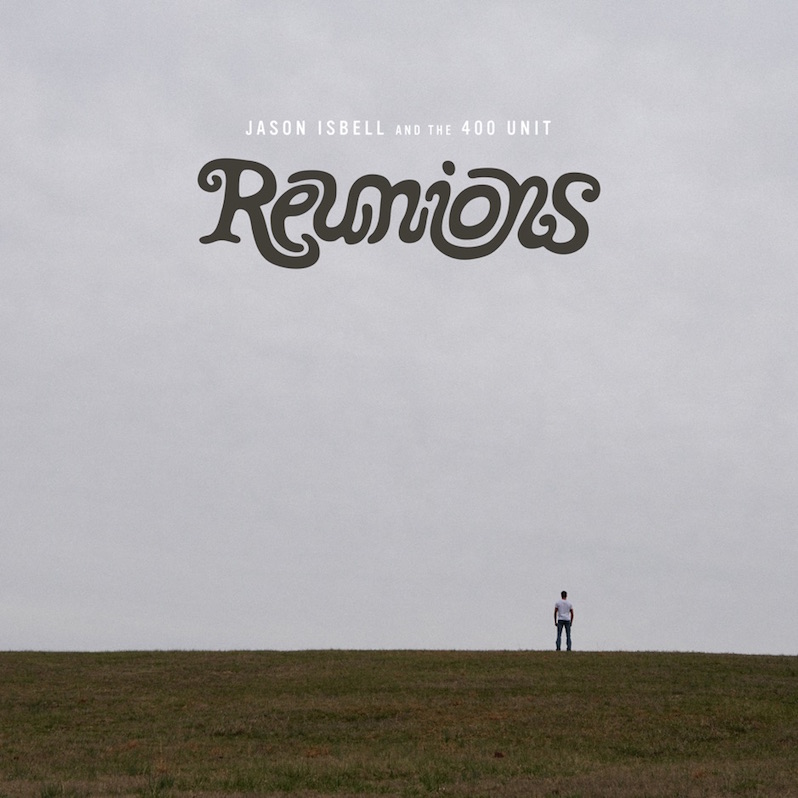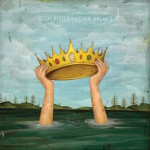Album of the Week: Jason Isbell and the 400 Unit – Reunions

What a goddamn band. The Nashville Sound, Jason Isbell‘s last album, represented a kind of breakthrough for the songwriter. It was his first in years to be credited to the band unit as opposed to a purely solo effort, though his band did feature prominently on the two breakthrough solo records that came before it. Sonically, it felt like an eruption, bursting with vibrancy and a near-novelistic emotional arc, paying as much care to the dynamic arc of the entire records as great songwriters do to a single song. Formally speaking, it felt like the fulfillment of ideas that had been roiling around Isbell’s head in terms of orchestration and songwriting in contemporary country music since Southeastern, and on that mark brought a sense of finality to that expressive span.
This raised the question of what would follow, and Reunions‘ answer is a curious one. It is an album of substantially muted dynamic range, all the songs living in roughly the same world of intensity and timbre. Its excursions into country rock are less raucous this time around, just as its divergences into stark folk are less unadorned and haunted than in the past. On paper, this sounds like a criticism, and I suppose in some ways it even might be, but thinking of it purely as a criticism to say Reunions is less purely dynamic than his last couple would be to ignore what he does within that more constricted timbral and dynamic ranges. There is a running conceit through Reunions of a psychedelic jangle-pop approach to country music deeply reminiscent of the Byrds, particularly that peak magical run from Fifth Dimension up to Sweetheart of the Rodeo where the band shift almost completely from lightly psychedelic folk into full-bore cosmic American music. It dawns on you a few songs in, as Isbell and the band continued to mine this same sonic space over and over, that they restrained themselves because the material was too strong to justify unduly leaving for novelty’s sake alone.
The production, engineering and mixing decisions all seem to be derived from this core songwriting approach, focusing here more than anywhere else in Isbell’s catalogue on supple and thoughtful overdubs meant to bring a warm and organic psychedelic gleam over the proceedings. This is perhaps the most meticulous mix on an Isbell record, well, ever, but the material justifies it; it is precisely because the music is no longer morosely stark acoustic solo pieces or strident and fuzzed out driving country rock that it can justify a more consistently rich approach to sonic layering. Songs of the style found across Reunions would appear on early Isbell records, of course, but before they were little slices of a very wide-ranging sonic palette whereas here they are a fully explored main course.
Isbell’s well-noted approach to sequencing upholds on Reunions. He and the band always had a knack not just for writing songs that feel comfortable next to one another but for sequencing them in a manner that feels deliberate, like an unfolding novel even if only by the slightly adjusting emotional cues of one song into the next. Before, the wide sonic shifts from solo to band numbers, folk to country to rock, would seem to signal big scene changes or emotional punch-ups; here, with the sense of internalism and reflection roughly as consistent as the sonics of song after song, the focus is more on the turning of a mind from angle to angle. The actual lyrical topics of the album range quite a bit, with the opener being a socially-conscious self-interrogation of social and interpersonal responsibility right next to a song about experiencing a divorce as a child and having the conflicting reminiscences of the peace of youth and those early experiences of emotional rupturing of spaces of love. This sense of range extends over the record in a manner not atypical to Isbell records from Southeastern on, where he first mastered his storytelling capabilities as well as nailing how to precisely balance personal songs from his lived experience versus fictional tales of created characters. What remains is Isbell’s gentle and beautiful literary touch, making these short stories feel like they elucidate some central unnamed and perhaps unnameable emotional truth that can only become sensible when all the pieces are placed together. The paradox of sonic restraint via types of songs versus sonic indulgence in their richness of production feels here more like Isbell tunneling in deep on a smaller, more difficult image, one that needs ten plus angles of interrogation to really grasp well versus the one or two of previous albums.
It helps that the songs are profoundly beautiful. This beauty extends from the instrumentals to the vocals, the progressions to the lyrics, the performances to the production. As great, and I mean truly, profoundly, shout-it-from-a-mountain great as Southeastern was and how that made possible everything that came after, it also felt at times the farthest from his earlier work in Drive-By Truckers that he’d ever been. The best sonic comparison for Reunions, aside from peak Byrds, would perhaps be the Truckers’ latest album, The Unraveling, which similarly saw them rein in the wildnesses of their youth for a more restrained and literary approach to their typically ruminative country rock. The throughline in both instances is in two elements, one musical and one lyrical.
On the musical end, Reunions focuses on simplicity over complexity, where the nuances and interests are developed through subtle little gestures rather than big things like brash chords or modulations or electronic textures. Solos, which are plentiful, are more in the vein of George Harrison than the complexities of someone like Bela Fleck or the (at times) raw intensity of electric Neil Young. It very much is a “right notes over more notes” approach, one informed by the band’s very deep catalog of known and respected music; interviews and social media and lists of covers they’ve performed show a band that willingly synthesizes everything from indie rock to country to rock to R&B to pop and everything in between, with Isbell even once name-checking loving Mastodon. What this means practically is that their bag of potential “right notes/right chords” for everything from melodies to progressions to solos is a deep one, favoring richness and carrying an artful touch that soberly never favors avant-garde artfulness over that unnamable full-hearted perfect of truly great country.
On the lyrical end, the beauty of Isbell’s music is often about the savagery of his insights and how they juxtapose against the comforting softness of his voice. There is a pleasantness and a sobriety (there’s that word again) to the timbre of Isbell’s voice, one that sound immediately like it will carry the pure insight of a child or that brief moment of horrific lucidity after a bender. Isbell is just as open about having literary taste when it comes to fiction and poetry, something you can pick up on immediately when looking at the savage grace of lines like, “She looks to you for what to do with all her delicate dreams / but you’re too terrified to be of any help.” It’s a simple and cutting lyric, the same way in great literary novels a line will come cutting through mossy clouds of language, an unbidden and often painful and self-recriminating insight emerging from the mists of often confusing experience. It’s this knack, well-practiced since his days with the Truckers and one the other members of the Truckers clearly practiced and nurtured themselves, that has made Isbell such a profoundly respected songwriter not just in the world of country but more broadly. He has a deft and continuous capability to be poetically dialectical, establish a beautifully phrased and cutting insight about some figure before in the next line turning that same interrogating lens on himself. These songs, like all of his songs, feel like he is taking each topic seriously, treating it with profound and spiritual seriousness, such that when he arrives on a gesture of love that in other hands might seem featureless, bland, generic, it suddenly feels rich and bursting with life. Isbell earns those big emotional spots by being so clearly attentive line by line, even knowing where precisely to leave the emotional development of a song so that when a solo comes in it feels as essentially lyrically driven as the words before it, a wordless imagistic emotionalist rumination or the way you cry to your parents’ favorite songs in a way that no one else can really understand.
Truthfully, when you are a songwriter as consistently insightful but tangible, able to simultaneously craft an immediate sing-along teary-eyed chorus after waves of that quintessentially southern way of mixing brutal truths and beautiful poetry, the sound of the songs almost doesn’t matter. That Reunions has both feels like a comical lavish bounty. The sonic approach of Reunions leans closer to the indie rock-by-way-of-country of a group like Wilco, even including what sounds like a nod to power pop legends Jellyfish in “Overseas,” than it does the heart-cage rattling country folk of Southeastern, but this if anything feels more like the 400 Unit’s return to his songwriting modality expressing itself more fully, developing as lush and singular a band’s sonic identity as his songwriting already has proven for him. That it seems to cite Tom Petty and the Heartbreakers in one gesture and Gram Parsons the next, power pop and the Byrds, the impossible thoughtfulness of Sheryl Crow’s early records and the increasing sophistication of similarly literary-folk heroes the Mountain Goats, feels like a fitting and necessary step, the only one plausible after what felt like the epoch-ending record that was The Nashville Sound. Reunions draws upon that record with a serious consideration: if the 400 Unit is back in full and these records are no longer conceived and credited as solo records, then it should be a band, god damn it, and that has to mean something. If Reunions is the template that the next few records from Isbell and the 400 Unit might sound, then the sterling run of someone quickly establishing himself as one of the very best country songwriters to have ever lived will continue in golden glory.
Label: Southeastern
Year: 2020
Similar Albums:
 Wilco – Ode to Joy
Wilco – Ode to Joy
 Josh Ritter – Fever Breaks
Josh Ritter – Fever Breaks
 Neko Case – Hell-On
Neko Case – Hell-On
Langdon Hickman is listening to progressive rock and death metal. He currently resides in Virginia with his partner and their two pets.

